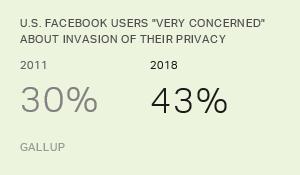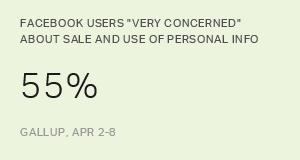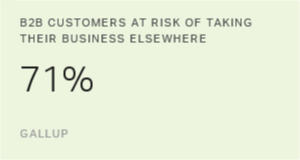Story Highlights
- Young adults are no more likely now to have a Facebook page than in 2011
- Meanwhile, significant growth among older users since then
- No difference in Facebook use between Republicans, Democrats
WASHINGTON, D.C. -- Facebook has consistently been most popular with younger adults aged 18 to 29, but the percentage of this group who use it -- currently 72% -- has not changed significantly since Gallup last measured it in 2011. Meanwhile, each older age group has shown significant growth in Facebook use since that time.
| 2011 | 2018 | Difference | |||||||||||||||||||||||||||||||||||||||||||||||||||||||||||||||||||||||||||||||||||||||||||||||||
|---|---|---|---|---|---|---|---|---|---|---|---|---|---|---|---|---|---|---|---|---|---|---|---|---|---|---|---|---|---|---|---|---|---|---|---|---|---|---|---|---|---|---|---|---|---|---|---|---|---|---|---|---|---|---|---|---|---|---|---|---|---|---|---|---|---|---|---|---|---|---|---|---|---|---|---|---|---|---|---|---|---|---|---|---|---|---|---|---|---|---|---|---|---|---|---|---|---|---|---|
| % | % | (pct. pts.) | |||||||||||||||||||||||||||||||||||||||||||||||||||||||||||||||||||||||||||||||||||||||||||||||||
| National adults | 46 | 56 | +10 | ||||||||||||||||||||||||||||||||||||||||||||||||||||||||||||||||||||||||||||||||||||||||||||||||
| 18 to 29 | 74 | 72 | -2 | ||||||||||||||||||||||||||||||||||||||||||||||||||||||||||||||||||||||||||||||||||||||||||||||||
| 30 to 49 | 57 | 65 | +8 | ||||||||||||||||||||||||||||||||||||||||||||||||||||||||||||||||||||||||||||||||||||||||||||||||
| 50 to 64 | 34 | 52 | +18 | ||||||||||||||||||||||||||||||||||||||||||||||||||||||||||||||||||||||||||||||||||||||||||||||||
| 65+ | 18 | 32 | +14 | ||||||||||||||||||||||||||||||||||||||||||||||||||||||||||||||||||||||||||||||||||||||||||||||||
| Figures for 2011 are averages of polls conducted in January and October | |||||||||||||||||||||||||||||||||||||||||||||||||||||||||||||||||||||||||||||||||||||||||||||||||||
| Gallup | |||||||||||||||||||||||||||||||||||||||||||||||||||||||||||||||||||||||||||||||||||||||||||||||||||
The greatest increase in Facebook use from 2011 to 2018 has been among adults aged 50 to 64. This group's rate of use has grown from about a third in 2011 to more than half today. Retirement-age adults have nearly doubled their rate of use.
Use of the social media platform has increased less among adults aged 30 to 49, by nine percentage points, to the current 65%.
Young adults are still the age group most likely to be on Facebook, but the gaps have narrowed considerably since 2011, with 30- to 49-year-olds reporting nearly as much use as those under age 30.
These data are from an April 2-8 Gallup poll, which found that Facebook users' concerns about invasion of their privacy had increased among all age groups since 2011, and was near the top of a list of user concerns.
CEO Mark Zuckerberg was recently questioned about Facebook's perceived anti-conservative bias at a congressional hearing, and Zuckerberg responded that the company operated under no political biases. Despite some conservative claims about the site's politically motivated censorship, there have been no meaningful differences between Republicans' and Democrats' use of Facebook in 2011 and 2018.
Women (61%) are more likely than men (51%) to report having a Facebook page; Gallup found a similar difference in 2011.
Majorities of All Education Groups Have a Facebook Account
Facebook was initially created as a platform for college students, and in 2011, majorities of adults who had some college experience, a college degree or graduate education reported having an account with the social networking site. Meanwhile, less than a third of adults with a high school education or less reported having a Facebook page.
In 2018, though, half of adults who have a high school education or less (50%) report being on Facebook -- an increase of 19 points since 2011. The website remains more popular among Americans with some college experience (57%), college graduates (61%) and adults with graduate education (67%) -- whose use has increased versus 2011.
| 2011 | 2018 | Difference | |||||||||||||||||||||||||||||||||||||||||||||||||||||||||||||||||||||||||||||||||||||||||||||||||
|---|---|---|---|---|---|---|---|---|---|---|---|---|---|---|---|---|---|---|---|---|---|---|---|---|---|---|---|---|---|---|---|---|---|---|---|---|---|---|---|---|---|---|---|---|---|---|---|---|---|---|---|---|---|---|---|---|---|---|---|---|---|---|---|---|---|---|---|---|---|---|---|---|---|---|---|---|---|---|---|---|---|---|---|---|---|---|---|---|---|---|---|---|---|---|---|---|---|---|---|
| % | % | (pct. pts.) | |||||||||||||||||||||||||||||||||||||||||||||||||||||||||||||||||||||||||||||||||||||||||||||||||
| High school or less | 31 | 50 | +19 | ||||||||||||||||||||||||||||||||||||||||||||||||||||||||||||||||||||||||||||||||||||||||||||||||
| Some college | 55 | 57 | +2 | ||||||||||||||||||||||||||||||||||||||||||||||||||||||||||||||||||||||||||||||||||||||||||||||||
| College graduates | 59 | 61 | +2 | ||||||||||||||||||||||||||||||||||||||||||||||||||||||||||||||||||||||||||||||||||||||||||||||||
| Postgraduates | 57 | 67 | +10 | ||||||||||||||||||||||||||||||||||||||||||||||||||||||||||||||||||||||||||||||||||||||||||||||||
| Figures for 2011 are averages of polls conducted in January and October | |||||||||||||||||||||||||||||||||||||||||||||||||||||||||||||||||||||||||||||||||||||||||||||||||||
| Gallup | |||||||||||||||||||||||||||||||||||||||||||||||||||||||||||||||||||||||||||||||||||||||||||||||||||
Bottom Line
Facebook has evolved as a social media platform, and its users' demographics have expanded. Though college students in the late 2000s may remember the site as one used primarily by their peers, Facebook is now used by their parents, grandparents and their friends without college experience as well.
As Facebook grapples with how to handle users' concerns about privacy and how their personal information is used, it will also have to consider its changing demographics. Young adults, whose use of the site initially propelled it to prominence, are no more active now on Facebook than they were in 2011, as the company must now compete with a bevy of other social networking platforms, including Twitter and Snapchat.
After seeing its first-ever decline in North American daily users in 2017, Facebook recently reported that it had reversed the decline in the first quarter of 2018, but the Cambridge Analytica data leak scandal could hamper future usage. How Facebook moves forward could determine not just its overall growth, but the demographics of its changing users.
Survey Methods
Results for this Gallup poll are based on telephone interviews conducted April 2-8, 2018, on the Gallup U.S. Poll, with a random sample of 1,509 adults, aged 18 and older, living in all 50 U.S. states and the District of Columbia. For results based on the total sample of national adults, the margin of sampling error is ±4 percentage points at the 95% confidence level.
For results based on the total sample of 785 Facebook users, the margin of sampling error is ±4 percentage points at the 95% confidence level.
All reported margins of sampling error include computed design effects for weighting.
Each sample of national adults includes a minimum quota of 70% cellphone respondents and 30% landline respondents, with additional minimum quotas by time zone within region. Landline and cellular telephone numbers are selected using random-digit-dial methods.
Learn more about how the Gallup U.S. Poll works.





